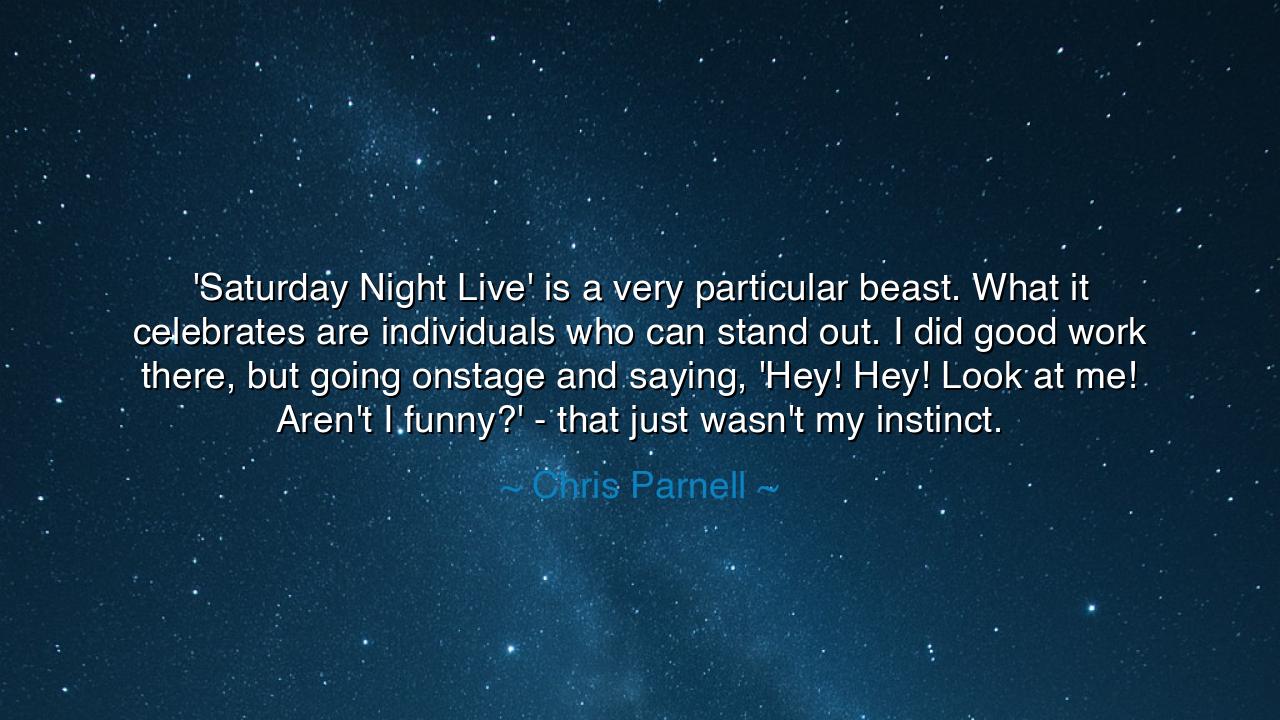
'Saturday Night Live' is a very particular beast. What it
'Saturday Night Live' is a very particular beast. What it celebrates are individuals who can stand out. I did good work there, but going onstage and saying, 'Hey! Hey! Look at me! Aren't I funny?' - that just wasn't my instinct.






Hear, O seekers of craft and truth, the words of Chris Parnell, the quiet master of laughter, who once said: “‘Saturday Night Live’ is a very particular beast. What it celebrates are individuals who can stand out. I did good work there, but going onstage and saying, ‘Hey! Hey! Look at me! Aren’t I funny?’—that just wasn’t my instinct.” These words, though spoken in humility, hold the weight of ancient wisdom—the wisdom of knowing oneself amid the roar of the crowd. In this reflection, Parnell reveals a struggle not of failure, but of identity: the struggle between authentic artistry and the demand for spectacle, between inner truth and outer noise.
He speaks first of Saturday Night Live, that hallowed stage of modern comedy, a place where the loud, the daring, and the outrageous often triumph. It is, as he calls it, “a particular beast”—wild, untamed, demanding constant attention. To survive there, one must not only be funny, but fearless in self-promotion. Yet Parnell, ever the craftsman, felt within him a different rhythm. His instinct was not to shout, “Look at me!” but to serve the moment, to shape the character, to strengthen the scene. He was the artisan among performers, the one who sought harmony where others sought dominance. His words remind us that greatness takes many forms—not only in the thunderous voice, but also in the steady hand that builds quietly, unseen.
The ancients knew this truth well. Consider the story of Epictetus, the stoic philosopher who lived his life as a slave yet became a teacher of kings. He taught that the path to peace is not in showing greatness, but in being it. “Do not explain your philosophy,” he said, “embody it.” So too did Parnell live by this creed in his art. Where others declared their brilliance through self-display, he embodied it through consistency and craft. He reminds us that the truest excellence is often invisible to those who seek only spectacle. The shouting performer may dazzle for a moment, but the dedicated craftsman endures for generations.
There is in his words, too, a deep humility—the humility of one who knows his strength and refuses to betray it. For Parnell understood that to imitate the loud would be to lose himself. The world, especially the world of fame, often rewards noise over substance. But the wise know that authenticity is the longest echo. He chose to remain faithful to his instinct, even if it meant being overshadowed by those more flamboyant. Such a choice is not weakness—it is courage of a rare and quiet kind, the courage to stand firmly in one’s truth while others chase applause.
Consider, too, the example of Leonardo da Vinci, whose genius was not always recognized in his own time. In workshops filled with artists painting grand gestures and bold colors, Leonardo would spend hours studying the movement of a single hand, the bend of a single leaf. To some, he seemed slow, unremarkable. Yet his art endures centuries later, while the louder names of his time have faded into dust. So too does Parnell remind us that true artistry lies not in performance for its own sake, but in the devotion to craft—the patient pursuit of excellence, even when unseen.
His quote also speaks to a deeper tension in every soul: the desire to be seen versus the longing to be genuine. Many will face moments where the world demands that they shout their worth. Yet the wise learn that worth does not need to shout—it radiates quietly. Parnell’s instinct, though it did not always suit the “beast” of Saturday Night Live, is a model for all who seek to work with integrity rather than vanity. His calm defiance whispers a powerful truth: to stand out is not always to stand above; sometimes, it is to stand apart.
Therefore, let this be the teaching drawn from his words: stay true to your nature, even when the world rewards a different one. If your gift is subtle, do not trade it for spectacle. If your instinct is quiet, do not force it into noise. The stage of life will always have its “particular beasts,” its loud arenas where fame calls for attention—but you need not answer in kind. Instead, answer with excellence. Let your craft speak when words cannot. Let your integrity shine when applause fades.
And so, my children of light and labor, remember this: it is better to do good work unseen than loud work without soul. The world may not always notice the steady builder, the humble artist, the servant of truth—but time will. Chris Parnell’s words remind us that to remain authentic in the face of spectacle is not only a creative choice—it is a moral one. For the greatest art, like the greatest wisdom, does not cry, “Look at me!” It simply is.






AAdministratorAdministrator
Welcome, honored guests. Please leave a comment, we will respond soon